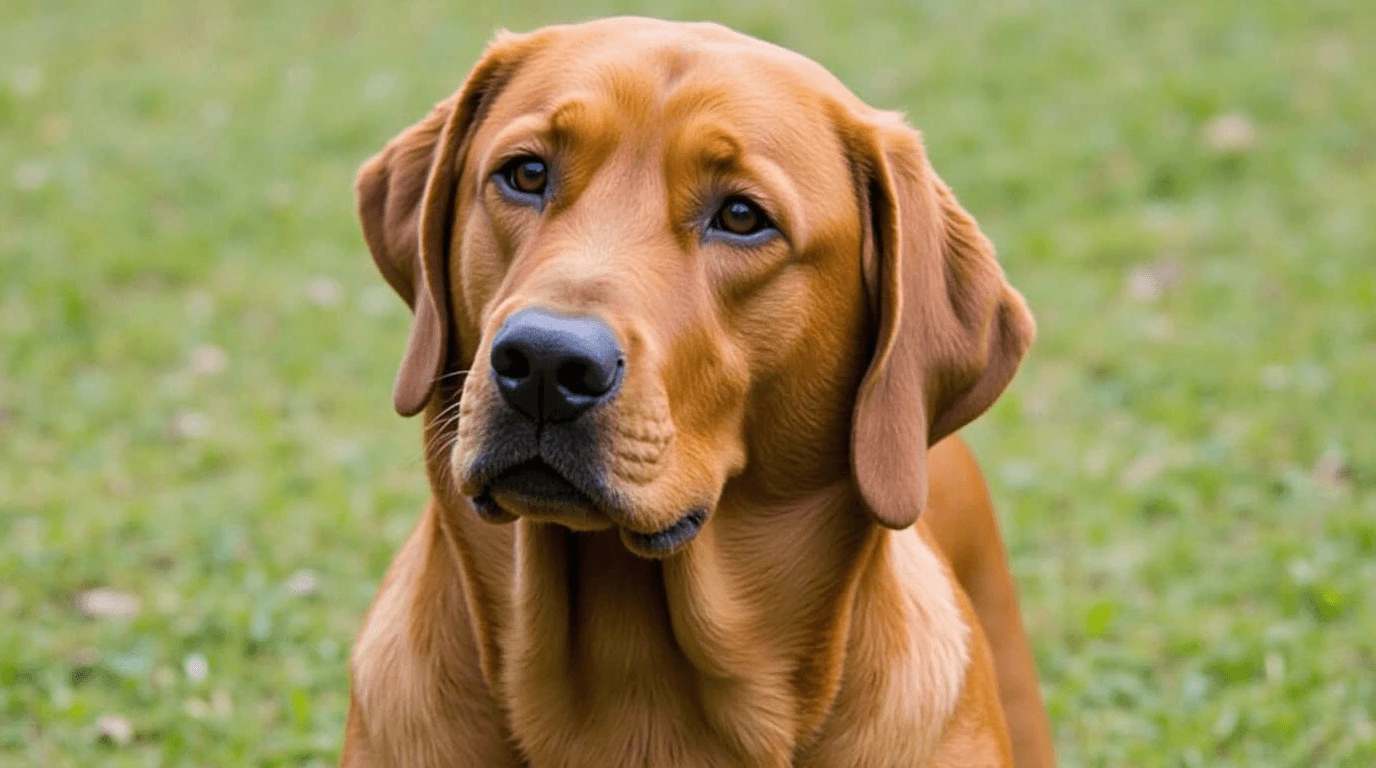When I first saw a fox red Labrador retriever, I was amazed by its coat. It looked like an autumn sunset. These dogs are not just beautiful; they also show a unique genetic journey in a beloved dog breed.
Fox red Labradors are not a different breed but a special color in the yellow Labrador family. They have a deep, vibrant red coat, unlike the lighter shades of standard yellow Labs. Hunters and outdoor lovers value these dogs for their striking looks and many uses.
Key Takeaways
- Fox red is a unique shade within the yellow Labrador color range
- These dogs originate from working retriever lines
- Coat color is determined by complex genetic interactions
- AKC recognizes fox red as part of the yellow Labrador category
- Red Labs are prized for their distinctive appearance

Understanding the Fox Red Labrador Color
When you see a fox red Labrador, you’ll be amazed by its beautiful, warm coat. These dogs are a special part of the yellow Labrador family. They have a unique color that has caught the eye of dog lovers for years.
Definition of Fox Red Labs
A fox red lab is a yellow Labrador with a deep, rich color. Their coat can range from golden-red to mahogany. This color comes from special genes that make them stand out from other yellow Labradors.
- Genetically classified as yellow Labradors
- Coat colors range from vibrant golden-red to deep mahogany
- Recognized by the AKC under the yellow color category
Historical Background of Red Labs
The story of fox red Labradors is interesting. They were once less popular than lighter-colored Labs. But in the 1980s, they started to gain more fans. Back then, breed standards favored lighter colors, making the red ones less popular.
| Historical Milestone | Year |
|---|---|
| British Kennel Club Recognition | 1903 |
| AKC Breed Recognition | 1917 |
| Fox Red Lab Popularity Surge | 1980s |
AKC Recognition and Standards
The American Kennel Club sees fox red Labs as part of the yellow Labrador family. They used to be less favored because of their darker color. But now, they have the same status as other Labradors. Their color is a result of interesting genetics that fascinates dog lovers everywhere.
A fox red Lab is not a separate breed, but a stunning color variation within the beloved Labrador Retriever family.
The Genetics Behind Red Colored Labrador Retrievers
Labrador color genetics is a world of fascinating genetic inheritance. The red lab genes are key to their unique coat color. Your Labrador’s coat color is a complex mix of many gene variants.
The main genes for coat color in Labradors are:
- E Locus (Extension gene)
- B Locus (Brown gene)
- K Locus (Black/Dominant black gene)
- A Locus (Agouti gene)
For a fox red Labrador, specific genetic combinations are needed. The MC1R gene is crucial, with seven variants affecting coat color. Dogs with ‘ee’ variants can have yellow to red coats, based on other genes.
“The beauty of genetic inheritance is that sometimes unexpected colors can surprise even experienced breeders.”
The red shade can vary a lot. The AKC DNA profile uses 201 genetic markers to predict coat colors. A study found red shades range from light golden to deep fox red, due to small genetic changes.
| Gene Variant | Potential Color Impact |
|---|---|
| Em | Dominant over other variants |
| e1 | Produces yellow pigmentation |
| ee genotype | Enables red/yellow coat expression |
Understanding these complex genetics shows the beauty behind your Labrador’s coat color.
Color Inheritance and Gene Expression
Labrador color inheritance is a fascinating topic in canine genetics. Your Lab’s coat color comes from specific genes that mix to create pigmentation and color. It’s a complex process.
The Role of E Genes in Labs
E genes are key in deciding if a Labrador will be yellow. They control melanin production, affecting coat color. In Labradors, E genes can:
- Determine if a dog will be yellow or another color
- Control pigment distribution across the coat
- Influence the intensity of color expression
B Gene Combinations and Color Outcomes
B genes also play a big role in a Labrador’s coat color. They work with E genes to create different colors. This includes:
| Gene Combination | Potential Color Outcome |
|---|---|
| BB or Bb | Black or Chocolate |
| bb | Chocolate |
Pheomelanin’s Impact on Coat Color
Pheomelanin is the pigment behind red and yellow coat colors in dogs. It’s what makes fox red Labradors so stunning. The amount of pheomelanin can change from light cream to deep red, based on genetics.
“Genetics is like a painting where each gene is a brushstroke creating the final masterpiece of color.” – Canine Genetics Expert
Your Labrador’s coat color is a result of complex genetics. This makes each dog’s color truly unique.
Physical Characteristics of Fox Red Labs
Fox red Labradors have a unique red coat that makes them stand out. They have the classic Labrador build but with a deep red color. This color can range from mahogany to golden-red.
These dogs have the same strong and athletic body as Labradors. They are built for work and being great companions.

| Characteristic | Description |
|---|---|
| Coat Texture | Dense, water-resistant double coat |
| Coat Color Range | Deep red to light golden-red |
| Eye Color | Usually brown, matching coat intensity |
Fox red labrador traits include a coat that changes color up to three times. Puppies may look different from adults. They usually settle into their final coat color around 9-12 months.
“The beauty of a fox red Lab lies not just in its color, but in its remarkable versatility and stunning physical presence.” – Canine Breed Experts
These dogs have a muscular build, showing their ability to work and be great companions. From their broad chest to their strong legs, fox red Labs are a perfect mix of strength and grace.
American vs English Red Fox Labs
Exploring red fox Labradors reveals interesting differences between American and English bloodlines. These differences go beyond looks, affecting structure, temperament, and breeding goals.
Structural Differences
American red fox labs are generally more athletic than English ones. Key physical differences include:
- American Labs: Taller, slender frame with narrower head
- English red fox labs: Stockier build with blockier head structure
- Tail differences: American Labs have a thinner “whippy” tail
Temperament Variations
The temperament of working line labradors and show line labradors varies:
- American Labs: Higher energy, more drive for active tasks
- English Labs: Generally calmer, more relaxed disposition
- Working lines tend to display more intense working characteristics
Working vs Show Lines
| Characteristic | Working Line Labs | Show Line Labs |
|---|---|---|
| Primary Purpose | Field work, hunting | Conformation, exhibitions |
| Energy Level | High | Moderate |
| Physical Build | Lean, athletic | Sturdy, compact |
Knowing these differences helps you choose the right red fox Labrador for you.
Health Considerations and Lifespan
Knowing about fox red labrador health is key for owners. These dogs live from 10 to 13 years with the right care and food.
Fox red Labradors face similar health issues as other Labradors. Owners should watch out for several important health points:
- Genetic predispositions to certain conditions
- Regular veterinary screenings
- Preventative health management
Some common health problems for fox red Labradors are:
- Hip Dysplasia: A genetic issue with joint development
- Elbow dysplasia
- Progressive Retinal Atrophy
- Exercise-Induced Collapse
To keep your fox red Lab healthy, take action. They need regular exercise, balanced food, and vet visits. Keeping them at a healthy weight is also key, as they can easily get fat.
“Prevention is always better than cure when it comes to your Labrador’s health.” – Veterinary Nutrition Experts
Here are some health screenings for fox red Labradors:
- Annual comprehensive physical examinations
- Hip and elbow joint assessments
- Eye health evaluations
- Genetic screening for inherited conditions
By knowing about health risks and taking steps to prevent them, you can help your fox red Labrador live a long, healthy, and joyful life.
Training and Exercise Requirements
Fox red Labradors are amazing friends with lots of energy. They need lots of training and exercise to be happy at home. These smart dogs need both physical activity and mental challenges.
Physical Activity Needs
Training fox red labs means knowing their high energy. Working line fox red Labs need more exercise than show lines. Your red lab needs:
- Daily walks of 60-90 minutes
- High-intensity fetch sessions
- Swimming activities
- Agility training
Mental Stimulation Methods
Keeping your fox red Lab’s mind active is key to stop bad behaviors. Good ways to keep them mentally sharp include:
- Puzzle toys that challenge problem-solving skills
- Obedience training sessions
- Scent work games
- Interactive retrieving exercises
Socialization Tips
Socializing red labs means exposing them to many people, places, and animals. Start early and keep it consistent. This helps your fox red Lab grow into a confident adult dog.
“A well-socialized Labrador is a confident and friendly companion.” – Professional Dog Trainer
Remember, every dog is different. Always talk to your vet to create a training plan that fits your fox red Lab’s needs.
Breeding Practices and Color Selection
Breeding fox red labradors needs special knowledge and careful planning. Breeders pick red lab puppies based on color inheritance. They aim for the fox red coat and keep the breed’s great qualities.
Understanding genetics is key in breeding fox red labradors. Breeders look for dogs with certain traits:
- Darker yellow coat coloration
- Strong genetic lineage
- Proven health certifications
- Desirable temperament traits
Genetic testing is vital for color selection. Skilled breeders use advanced methods to guess coat colors. They also aim to avoid health issues.

| Breeding Consideration | Key Factors |
|---|---|
| Color Genetics | E-locus and B-gene combinations |
| Health Screening | Hip, eye, and genetic disorder tests |
| Temperament | Calm, trainable disposition |
When picking red lab puppies, look at their genetic background. Not all yellow labs will produce fox red offspring. Knowing about pheomelanin genes helps guess coat colors better.
“The art of breeding is balancing color preference with overall breed excellence.” – Professional Labrador Breeder
Good breeders focus on the dog’s health and personality. They care more about the dog’s well-being than just its looks when breeding fox red labradors.
Finding a Reputable Fox Red Lab Breeder
Finding the right fox red lab breeder takes time and research. It’s the first step to getting a healthy Labrador puppy. Look for breeders who care about the health and responsible breeding of dogs.
Essential Health Tests for Labradors
When picking a labrador breeder, look for health tests. These tests help keep your future pet healthy. Good breeders do these tests to check for genetic health issues:
- Hip and elbow dysplasia evaluations
- Eye health certification
- Genetic screening for inherited conditions
- EIC (Exercise Induced Collapse) DNA testing
- Genetic screening for prcd-PRA (progressive retinal atrophy)
Critical Questions for Potential Breeders
Before choosing a breeder, ask important questions:
- Can you show me health clearance certificates?
- What genetic tests have been performed on the parents?
- Do you offer a health guarantee?
- May I meet the puppy’s parents?
- What socialization practices do you use?
Red Flags to Watch For
Watch out for signs of bad breeding practices:
- Unwillingness to share health documentation
- Breeding dogs without proper health screenings
- Multiple litters available simultaneously
- No interest in interviewing potential owners
- Pricing that seems suspiciously low
A truly reputable fox red lab breeder will be open, focus on health, and care about the puppies’ well-being.
Caring for Your Fox Red Labrador
Caring for a fox red Lab needs dedication and knowing their special needs. These dogs need a lot of attention to stay healthy and happy. Taking care of them means looking after their physical, mental, and grooming needs.
Keeping your fox red Lab looking and feeling great is key. Their short, dense coat needs regular care to manage shedding and keep it healthy. Here are some grooming tips:
- Brush weekly to remove loose fur and distribute natural oils
- Bathe every 6-8 weeks using dog-specific shampoo
- Check and clean ears regularly to prevent infections
- Trim nails monthly to avoid discomfort
Exercise is very important for fox red Labs. They need lots of physical activity to stay healthy. Here’s what you should aim for:
- 1-2 hours of daily exercise
- Mix of walks, runs, and interactive play
- Mental stimulation through training games
| Care Aspect | Recommendation |
|---|---|
| Daily Exercise | 1-2 hours |
| Weight Range | 55-80 pounds |
| Typical Height | 22 inches |
| Average Lifespan | 12 years |
What your fox red Lab eats is very important for their health. Choose high-quality dog food that fits their age and how active they are. Watch their food portions to avoid obesity, a big problem in Labradors. Regular vet visits are key to catch health issues early.
“A well-cared-for Labrador is a happy companion for life.” – Veterinary Nutrition Expert
Socializing and positive training are crucial for your fox red Lab. They help your dog become well-adjusted and confident. Start early and be patient as they grow.
Conclusion
Exploring fox red Labradors shows us a breed that’s more than just their beautiful coat. They are smart and friendly, making them great family pets. Their rich red color makes them stand out from other Labradors.
To truly understand fox red Labradors, we must look at their genetics and traits. They are very smart, easy to train, and love people. Whether you want a working dog or a show dog, they bring lots of energy and love to your home.
Being a good owner to a fox red lab means taking care of them well. This includes regular vet visits, healthy food, training, and lots of exercise. Their unique coat needs proper care to stay beautiful.
Table of Contents
Getting a fox red Labrador is about gaining a loyal and smart friend. Their special color is just the start of a wonderful bond. This bond is built on trust, fun activities, and endless love.

